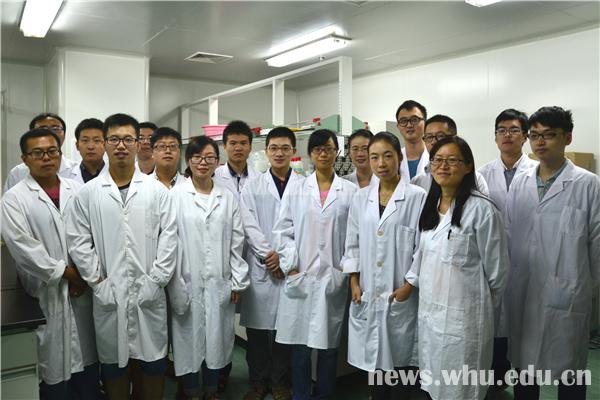On 1st June. Professor Li Hongliang and his research group published online their latest research findings on Nature Communications. The papers make cardiac hypertrophy and heart failure more widely understood by the people and may become a new breakthrough in clinical treatment of heart failure.
The two papers are entitled The ubiquitin E3 ligase TRAF6 exacerbates pathological cardiac hypertrophy via TAK1-dependent signaling and Suppressor of IKKε is an essential negative regulator of pathological cardiac hypertrophy respectively. The first authors are Ji Yanxiao, a postdoctoral researcher, and Dr. Deng Keqiong of Animal Experimental Center. Professor Li is the corresponding author. The research findings are financed by the National Science Fund for Distinguished Young Scholars, National Science and Technology Support Program and the National Science Foundation.
Cardiovascular disease is the major cause of death worldwide. Patients with cardiovascular disease in China have reached 290 million and the disease has the highest morbidity and mortality rates among all the other diseases, yet we have little awareness of pathogenesis of cardiovascular disease. Research illustrates the significant role of natural immune regulating network in infection prevention and cardiovascular disease regulation and control. TRAF6 and IKK inhibitor (SIKE) are two key regulatory molecules in the natural immune regulating network, with one acting positively and the other negatively in the regulation. Nevertheless, it is still unknown about the function and regulating mechanism of TRAF6 and SIKE dealing with pathological cardiac hypertrophy and heart failure.
This research finding demonstrates that hypertrophic progression triggers auto-ubiquitination of TRAF6 and further promotes the ubiquitination and phosphorylation of TAK1; Meanwhile, SIKE will alleviate the inhibition of TBK1 when it responses to the stimulus. The triggered TAK1 and TBK1 can activate two crucial regulating axis of hypertrophy which acts as signal pathways TAK1-JNK/p38 and TBK1-AKT-mTOR/GSK3β, and eventually lead to pathological cardiac hypertrophy and heart failure. Such regulating mechanisms are verified in a primate’s lentivirus vector-mediated treating model which is called cynomolgus macaques.
Li Hongliang has been engaged in the study of cardiovascular metabolic diseases for over a decade. He has conducted profound research and has been exploring about the function of natural immune regulating system of cardiovascular metabolic diseases with a series of significant research outcomes. He has already published Apart from his achievement of more than 100 papers published on international journals, with nearly 3,000 citations of SCI papers, he was elected Most Cited Chinese Researchers (Medical Science) in 2014 and 2015 respectively.
Professor Li is the director of Animal Experimental Center of Wuhan University (A3 Laboratory). He is also the winner of the National Science Fund for Distinguished Young Scholars, chair professor of "Cheung Kong Scholar" and is elected as “Youth Innovation Leader of Ministry of Science and Technology” and Trans-Century Training Programme Foundation for the Talents of Humanities and Social Science by the State Education Commission, “Talents Recruitment Plan” of Hubei Province.

Professor Li Hongliang and his team
Link to the two articles: http://www.nature.com/ncomms/2016/160601/ncomms11267/full/ncomms11267.html
http://www.nature.com/ncomms/2016/160601/ncomms11432/full/ncomms11432.html
(Rewritten by Jin Yiwen, Edited by Shen Yuxi, Wang Mengtian, Mark & Hu Sijia)